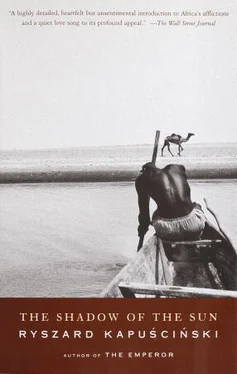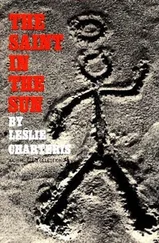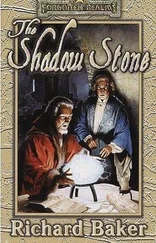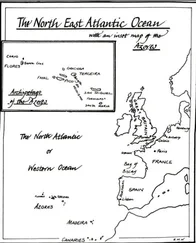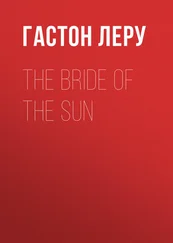The more time passed, the farther we drove, circling and straying, the more anxious I became. We had not encountered any people since morning. We had also not come upon either a larger road or any kind of signpost. The heat was terrifying, and it intensified with every minute, as if the road we were on, and all others as well, led directly toward the sun, and as we drove we were inexorably approaching the moment we would be consumed by fire, like offerings laid at its altar. The burning air started to quiver and undulate. Everything was becoming fluid, each view blurred and washed out as in a film left running out-of-focus. The horizon receded and smudged, as if subject to the oceanic law of ebb and flow. The dusty gray parasols of the acacias swayed rhythmically and moved about — as if some confused madmen were tossing them here and there, at a loss for anything better to do.
But the worst by far was that the tangled net of roads that had held us in its treacherous and suffocating grip for several hours now itself twitched and began to move. I could see that the web, the entire intricate geometry, which admittedly I had not been able to decipher but which nonetheless was a kind of constant, a fixed element upon the surface of the savannah, was now thrashing about and drifting. Where was it drifting to? Where was it pulling us, entwined in its coils? We were all being swept somewhere, Leo, the car and I, the roads, the savannah, the buffalo, and the sun, toward some unknown, shining, white-hot space.
Suddenly, the engine stopped and the car came to an abrupt halt. Leo, seeing that something was wrong with me, had turned off the ignition. “Give it to me,” he said. “I’ll drive.” We continued this way until the heat diminished, and it was then that we spotted two African huts in the far distance. We drove up. They were empty, with no doors or windows. There were some wooden bunks inside. The houses clearly did not belong to anyone, and were simply intended for travelers who happened by.
I don’t know how I found myself on one of the bunks. I was half dead. My head was pounding from the sun. To overcome drowsiness, I lit a cigarette. It didn’t taste good. I wanted to put it out, and when I looked at my hand, which was reaching instinctively for the ground, I saw that I was about to extinguish the cigarette on the head of a snake lying under the bed.
I froze. Froze to such a degree that instead of quickly pulling back my hand, I left it suspended, cigarette burning, over the snake’s head. Slowly, the reality of my position dawned on me: I was the prisoner of a deadly reptile. I knew one thing for certain: I could not move a muscle, because then the snake would attack. It was an Egyptian cobra, yellowish gray, neatly coiled on the floor. Its venom brings death quickly, and in our situtation — with no medicines, and the nearest hospital probably a day’s driving away — death would be inevitable. It was possible that at that very moment the cobra was in a state of light catalepsy (a condition of numbness and lethargy apparently typical of these reptiles), because it did not stir. My God, what should I do? I thought feverishly, by now completely wide awake.
“Leo,” I whispered loudly. “Leo, a snake!”
Leo had been in the car, getting our luggage out. We stared at each other silently, not knowing how to proceed. Yet time was running out: Were the cobra to awaken, it would probably attack instantly. Because we had no weapons of any kind, not even a machete, we decided that Leo would get a metal canister from the car and with it we would try to crush the cobra. It was a risky plan, but it was all we could come up with. We had to do something. Our inaction was giving the snake an advantage.
The canisters, from old British army supplies, were large, with sharp, protruding edges. Leo, who was a powerful man, grabbed one and started to creep toward the hut. The cobra was still just lying there, motionless. Leo, grasping the canister by its handles, lifted it up and waited. He was calculating, positioning himself, aiming. I lay still as stone on the bunk, tense, ready. And then suddenly, in a split second, Leo, holding the canister before him, threw his entire weight upon the snake. At which moment I too fell with my whole body on top of him. In these seconds, our lives hung in the balance — we knew this. Actually, we only thought of it later, for the instant the canister, Leo, and I came down on top of the snake, the interior of the hut exploded.
I never suspected there could be so much power within a single creature. Such terrifying, monstrous, cosmic power. I had assumed that the canister’s edge would easily cut through the snake — nothing of the kind! I now saw we had beneath us not a snake, but a throbbing, vibrating steel spring, impossible to either break or crush. The cobra was thrashing and pounding the ground with such demented fury that the hut’s interior grew dark from the dust. Under the powerful blows of its tail, the clay floor was crumbling and scattering, blinding us with clouds of debris. At one point it suddenly occurred to me with horror that we wouldn’t manage, that the reptile would slip out from under us and, in pain, wounded, enraged, would start to bite us. I pressed down even harder on my friend. He was groaning, his chest crushed against the canister, unable to breathe.
Finally, but this took a long time, an eternity, the cobra’s blows started to lose their impetus, vigor, frequency. “Look,” Leo said. “Blood.” Indeed, into a crevice along the floor, which now resembled a shattered clay dish, a narrow trickle of blood was slowly seeping. The cobra was weakening, and the vibrations of the canister, which we felt the whole time and by means of which the snake signaled us about her pain and her hatred, vibrations that terrified and panicked us, were also diminishing. But now, when it was all over, when Leo and I rose and the dust began to settle and thin out and I gazed down again at the narrow ribbon of blood being quickly absorbed, instead of satisfaction and joy I felt an emptiness inside, and something else as well: I felt sad that that heart, which inhabited the very pit of hell we had all shared through a bizarre coincidence only a moment ago, that that heart had stopped beating.
The next day we stumbled upon a wide, rust-colored track that, in a wide arc, circumscribed Lake Victoria. Driving several hundred kilometers through a green, luxuriant, fertile Africa, we reached the Ugandan border. It wasn’t really a border. A simple shed stood by the side of the road, with the sign “Uganda” burned out on a wooden board above the door. The shed was empty and shuttered. The kinds of borders for which blood is spilled were still to come into being.
We drove on. Night had already fallen. Everything that in Europe is called dusk and evening here lasts only a few minutes, if it exists at all. It is daytime, and then night, as if someone has turned off the sun’s generator with one flip of the switch. All at once, all is black. In one instant we are inside the night’s darkest core. If this change surprises you as you are walking through the bush, you must stop immediately: you can see nothing, as if somebody has unexpectedly pulled a sack over your head. You become disoriented, you don’t know where you are. In such darkness people converse without seeing one another. They might call out to one another, not realizing they are standing side by side. The darkness separates people, and thereby intensifies all the more their desire to be together, in a group, in a community.
The first hours of the night are the most social time in Africa. No one wants to be alone then. Being alone? That’s misfortune, perdition! Children don’t go to sleep early here. We enter the land of dreams together — as a family, a clan, a village.
Читать дальше
